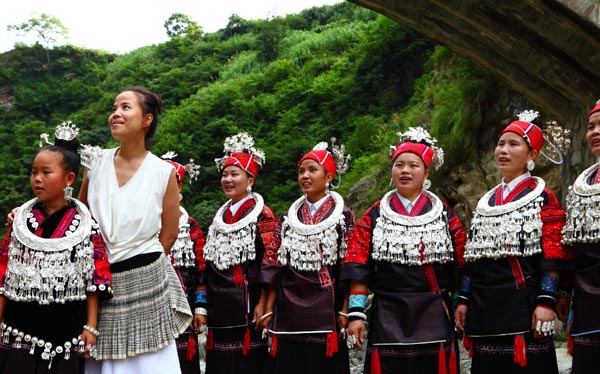 |
|
Dadawa traveled to the remote regions where Chinese ethnic groups live when making her new album. |
 |
| Moonrise shines bright with surprises |
 |
| On a high note |
 |
| The youth sounds out |
"Actually, musicians of my generation, who have grown up in the past 20 or 30 years, know little about our own culture," she says at a lecture on Moonrise in Guangzhou's Fangsuo Commune on Dec 8. She is dressed in a white gown and wears a faint smile most of the time, but she gets emotional about music.
"We have been following the West's musical trends in the past 30 years. It's time for China's top musicians and young music lovers to look back to the country's musical legacies with a centuries-long history," Dadawa says.
Appointed as a goodwill ambassador of the United Nations Development Program in 2009, Dadawa led a group of 10 on a four-month journey of discovery of "neglected national treasures". The 20,000-kilometer trip covered remote areas in Yunnan and Guizhou provinces, and the Inner Mongolia, Xinjiang Uygur and Tibet autonomous regions.
The crew traveled across mountains and rivers into the origins of ethnic music, collecting samples from inheritors of the indigenous music. Dadawa frets about the so-called ethnic music wave, which she finds to be superficial, and says understanding indigenous music demands immersion.
She discovered a group of Tibetans singing and waving their long sleeves for their traditional dance called xuan zi on the mountain, 4,000 meters above sea level.
Another day, she sat on the grass in Guizhou, listening to a group of Miao people dressed in their traditional attire, singing a love song and imitating the sounds of nature perfectly. Their sonorous voices reverberated in the valley and, Dadawa says, penetrated directly and deeply into her bones.
The most touching moment happened when Dadawa suffered altitude sickness in Tibet. Her host, Toinzhub, let her lie on the bed to recover and played a six-string guitar, a traditional Tibetan plucked instrument, soothing Zhu's pain.
"Toinzhub sang in praise of the magnificent snow mountains. He played only one note, and it went faster and faster," she recalls.
"The melody was still stuck in my mind when I went back to Beijing. So my composing partner and I developed a song based on that, which is Mountain Top on my new album."
|
|
|
|
|
|
|
|
